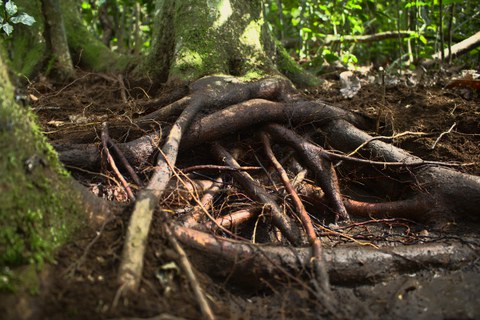May 17, 2021
How cooperative root networks can help stressed trees

Mangrove roots that have grown together to form a network.
Those who have good networks get through difficult life situations better. A research group headed by Uta Berger, Professor of Forest Biometry and Systems Analysis at the TU Dresden, was also able to demonstrate what applies to us humans for mangrove trees. The results of the research project “Kropotkin‘s Garden” have now been published in the renowned Nature magazine “Communications Biology”. The Volkswagen Foundation funded research as part of its “Off the Beaten Track” program.
The fact that the roots of trees of the same or even different species grow together and thus connect to form networks is nothing new. However, the exact significance of this for forest ecology is still largely unknown. The results of the researchers from TU Dresden, University of Glasgow, Mende University Brno and the Instituto de Ecología in Veracruz, Mexico bring essential new insights: The investigations in the La Mancha lagoon on the Gulf of Mexico confirmed the hypothesis that it is root networks are a survival strategy. In times of scarcity, the mangroves exchange water and the nutrients dissolved in it via the networked roots. The trees that have better access to the water can also supply neighboring trees. Research shows that mangroves connected by root networks are larger on average. In addition, the number of networks increased with the salinity in the soil, an indicator of drought stress. This shows that the connections that the trees form with each other via the roots and for which they have to expend energy, obviously offer advantages for the group.
The size of the group - i.e. the number of mangroves connected in the root networks - is by no means irrelevant. The research suggests that there is such a thing as an optimal group size. However, the greater the stress to which the trees are exposed, the smaller it is. The underlying regulatory mechanisms or how exactly the trees interact with each other and redistribute resources are questions that require further research.
Research project: https://mangroverootnetworks.info
Publication: https://www.nature.com/articles/s42003-021-02044-x
Information for Journalists:
Prof. Uta Berger
Tel.: +49 35203 38-31613
